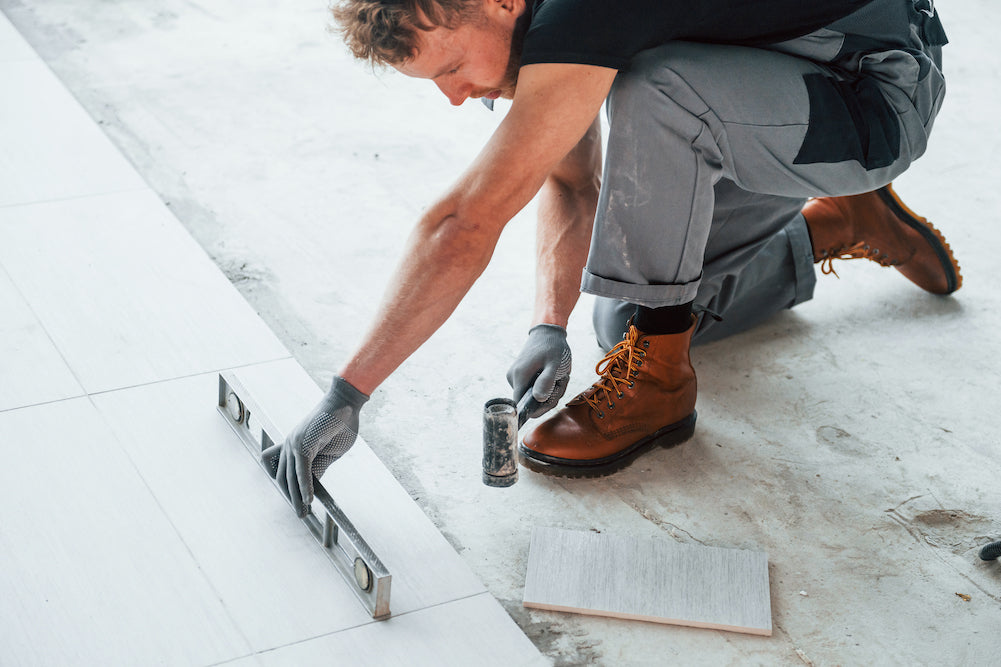Maintaining a well-kept home or commercial space is essential for creating a welcoming and aesthetically pleasing environment. One crucial aspect of maintaining tiled surfaces is the proper installation and maintenance of grout lines. Grout sealers play a vital role in protecting and enhancing the longevity of tiles. In this blog post, we will explore the importance of grout sealers, their benefits, and the process of choosing and applying the right sealer for your tiles.
What is Grout Sealer?
Grout sealer is a protective coating applied to the grout lines between tiles. Its primary purpose is to create a barrier that prevents moisture, stains, and dirt from penetrating the grout and damaging the underlying surface. By sealing the grout lines, you can extend the lifespan of your tiles and maintain their appearance for years to come.
There are two main types of grout sealers: penetrating sealers and topical sealers. Penetrating sealers are absorbed into the porous grout, forming a protective barrier from within. Topical sealers, on the other hand, create a layer on top of the grout, providing a physical barrier against stains and moisture.
You can find grout sealer at your local Home Depot or Lowes!
Benefits of Using Grout Sealer
- Prevents stains and discoloration: Without a protective sealant, grout lines are susceptible to staining from spills, dirt, and other contaminants. By applying a grout sealer, you can prevent these stains from penetrating the grout and keep your tiled surfaces looking clean and fresh.
- Protects against water damage and mold growth: Moisture can seep into unsealed grout lines, leading to water damage and mold growth. Mold not only compromises the integrity of the grout but also poses health risks. A grout sealer acts as a barrier, preventing water from penetrating and protecting against mold growth.
- Enhances durability of grout lines: Grout lines are subjected to everyday wear and tear, and without proper protection, they can deteriorate over time. A grout sealer helps to strengthen the grout, making it more resistant to cracking, chipping, and crumbling.
- Maintains the appearance of tiled surfaces: Over time, unsealed grout lines can become discolored, dull, and unattractive. By applying a grout sealer, you can maintain the original color and appearance of your tiles, keeping them looking vibrant and beautiful.
- Cost-effective in the long run: While the initial cost of purchasing and applying a grout sealer may seem like an additional expense, it is a cost-effective investment in the long run. By protecting your grout lines, you can avoid costly repairs or replacements down the line.
The Challenge: Effectively Sealing Grout Lines
One of the primary challenges in sealing grout lines is the porous nature of grout. If grout is not properly sealed, it can absorb liquid, stains, and dirt, leading to discoloration and damage. Additionally, improper sealing can result in the sealer not adhering properly to the grout, rendering it ineffective.
To overcome this challenge, it is crucial to choose a high-quality grout sealer that is specifically designed for your type of tile and grout. High-quality sealers are formulated to penetrate the grout effectively and create a strong protective barrier.
Choosing the Right Grout Sealer
When selecting a grout sealer, there are several factors to consider to ensure you choose the right one for your specific needs:
- Type of tile and grout: Different types of tiles and grout require different types of sealers. Ceramic tiles, for example, may require a different sealer than natural stone tiles. It is important to consider the compatibility of the sealer with your specific tile and grout to achieve optimal results.
- Location of tiled surface: The location of the tiled surface also plays a role in choosing the right sealer. High-moisture areas such as bathrooms or outdoor spaces may require a more water-resistant sealer, while low-moisture areas may only need a standard sealer.
- Durability and longevity of sealer: Some sealers offer long-lasting protection, while others may require more frequent reapplication. Consider the durability and longevity of the sealer to ensure you choose one that suits your maintenance preferences and lifestyle.
Recommended Brands and Products
There are several reputable companies that specialize in grout sealers. While we cannot endorse specific brands or products, a quick online search will provide you with a list of highly-rated sealers to consider. Look for customer reviews and ratings to gain insights into the performance and effectiveness of different sealers. Here are a few to get you started: Aqua-X, Clean-EEZ, and Black Diamond
How to Apply Grout Sealer
Applying grout sealer is a relatively simple process that can be done by most homeowners. Here is a step-by-step guide to help you:
- Preparing the surface: Before applying the sealer, ensure that the grout lines are clean and free from dirt, stains, and debris. Use a grout cleaner and a grout brush to thoroughly clean the grout lines. Allow the grout to dry completely before proceeding.
- Applying the sealer: Follow the instructions provided by the manufacturer for application. Typically, you will need to use a brush or applicator to apply the sealer evenly across the grout lines. Take care not to get the sealer on the tiles themselves, as it may leave a residue.
- Drying and curing time: Allow the sealer to dry for the recommended time specified by the manufacturer. This can vary depending on the type of sealer used. Once dry, apply a second coat if recommended.
- Additional tips and techniques: It is advisable to work in small sections when applying the sealer to ensure even coverage. Wipe off any excess sealer from the tiles immediately to avoid leaving a residue. It is also important to ventilate the area properly during and after the application process.
Maintenance Tips for Sealed Grout
While grout sealers provide excellent protection, regular maintenance is still necessary to ensure the longevity of your tiled surfaces. Here are some maintenance tips for sealed grout:
- Regular cleaning routines: Establish a regular cleaning routine to keep your grout lines clean and free from dirt and stains. Use a mild detergent or grout cleaner and a grout brush to scrub the grout lines gently. Avoid using abrasive cleaners or brushes that may damage the sealer.
- Avoiding harsh cleaners: Harsh chemicals and cleaners can weaken the sealer and compromise its effectiveness. Avoid using bleach or acidic cleaners on sealed grout lines. Instead, opt for mild, pH-neutral cleaners that are specifically designed for use on sealed surfaces.
- Using grout brushes: Grout brushes are specifically designed to clean grout lines effectively. Use a grout brush to agitate the cleaner and remove dirt and stains from the grout. Be sure to choose a brush with bristles that are appropriate for your type of grout to avoid scratching or damaging the surface.
- Reapplying sealer as needed: Over time, the protective barrier created by the sealer may wear off. It is important to monitor the condition of your grout lines and reapply the sealer as needed. Follow the manufacturer’s recommendations for reapplication intervals to ensure ongoing protection.
Sealing vs. Not Sealing Grout: A Comparison
To understand the importance of grout sealers, let’s compare the pros and cons of sealing grout lines:
Pros of sealing grout lines:
- Prevents stains and discoloration
- Protects against water damage and mold growth
- Enhances durability and longevity of grout lines
- Maintains the appearance of tiled surfaces
Cons of not sealing grout lines:
- Susceptible to stains and discoloration
- Prone to water damage and mold growth
- Increased risk of grout deterioration and damage
- Diminished appearance of tiled surfaces
Cost comparison: While the initial cost of purchasing and applying a grout sealer may seem like an additional expense, it is important to consider the long-term cost savings. By protecting your grout lines, you can avoid costly repairs or replacements in the future.
Impact on durability and appearance: Sealing grout lines significantly enhances the durability and appearance of tiled surfaces. Properly sealed grout lines are less prone to damage, stains, and discoloration, ensuring that your tiles maintain their original beauty for years to come.
Alternative Perspective: Rethinking Grout Sealer
Taking a proactive approach to tile longevity involves investing in grout sealers. By preventing damage before it occurs, you can save time, money, and effort in the long run. High-quality sealers play a crucial role in protecting your investment and ensuring the longevity of your tiles.
Conclusion
Grout sealers are essential for maintaining the longevity and appearance of tiled surfaces. They provide protection against stains, water damage, mold growth, and deterioration. By choosing the right grout sealer, applying it correctly, and maintaining regular cleaning routines, you can ensure that your tiles remain beautiful and functional for years to come. Don’t wait until damage occurs; take action now and unlock the full potential of your tiled spaces with grout sealers.








Reader Interactions